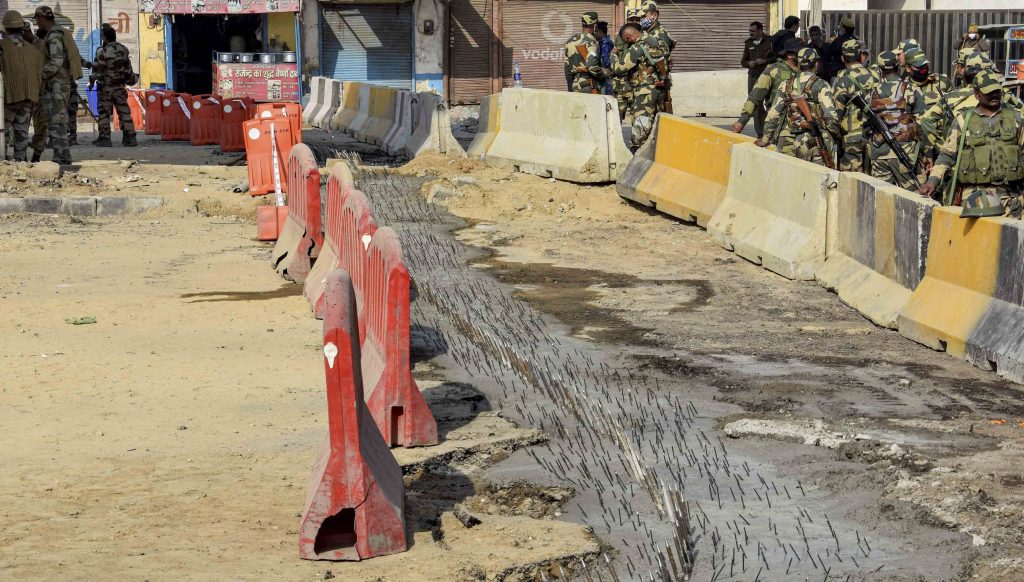New Delhi: Farmers’ agitation sites just outside Delhi resemble ‘international border’ now. Authorities have built makeshift walls, planted huge metal spikes on roads and deployed concertina wire fences, protesters alleged Wednesday. However, officials defended the heavy barricading and cited law and order issues. The heightened security measures and various restrictions have been imposed at the three protest sites. They are Singhu (Delhi-Haryana border), Ghazipur (Delhi-Uttar Pradesh border) and Tikri (Delhi-Haryana border). The fortification started since the Republic Day violence. It left over 500 police personnel injured and one protestor dead.
Breaking away from the designated routes for a tractor parade, hundreds of protestors clashed with police January 26. They laid siege to the Red Fort and climbed the flagpole to hoist a religious flag.
At the Singhu border, the epicentre of the ongoing farmers’ agitation, shipping containers, iron rods between barriers and cement slabs have been used to seal the entry points. The tried-and-tested barbed wires, stone boulders and iron nails have been deployed at Tikri and Ghazipur borders to block people’s entry into Delhi or to the protest sites.
“The protest sites are looking like international borders. It is as if we have come from Pakistan. On one hand, they (the government) want us to talk. On the other hand they are doing everything to de-link us (from the city),” farmer leader Kulwant Singh Sandhu told this agency. “This shows the restlessness of the government,” he said.
In addition to heavy-metal barricades and concrete slabs, measures like digging trenches and using DTC buses as roadblocks have been deployed.
Zamhoori Kisan Sabha General Secretary Sandhu claimed the barricading of national highways and stopping the movement of people and vehicles is the authorities’ ‘strategy’ to ‘irritate’ the common people. This way their opinions will turn against the protesting farmers.
“But the farmers won’t budge,” Sandhu asserted. “No matter how much obstruction they create in our path. They are stopping people so that they get irritated and turn against us. They (the authorities) don’t know that the locals and people across India support our movement. Sadly, the government has not learnt its lesson from the Ghazipur incident,” he added.
Mandeep Singh (26) has been camping at the Singhu border for the past 15 days. He echoed his leader’s sentiment. He said the show of force and blocking the roads pose problems for the locals, not the protesting farmers.
“These multiple-barriers cannot dampen our spirit or affect our movement. We are following the instructions of our leaders, who have clearly told us to stay put at our respective places. We won’t move ahead or take a step back. So, ultimately it is the locals who have to face trouble in commuting, not us,” said Mandeep, from Punjab’s Ludhiana district.
“We will not relent. We are protesting peacefully. We will continue our protests until our demands are met,” he added.
Several locals, the protesting farmers said, have been helping them. They are providing electricity connection from their houses and giving access to toilets and washrooms to the women protestors. Some are also sharing their shop’s wi-fi connection as the Central government has suspended internet at the protest sites.
Thousands of security personnel – including the Provincial Armed Constabulary (PAC) and Rapid Action Force (RAF) – armed with batons, teargas shells and ammunition are seen maintaining a strict vigil at the protest sites throughout the day.
